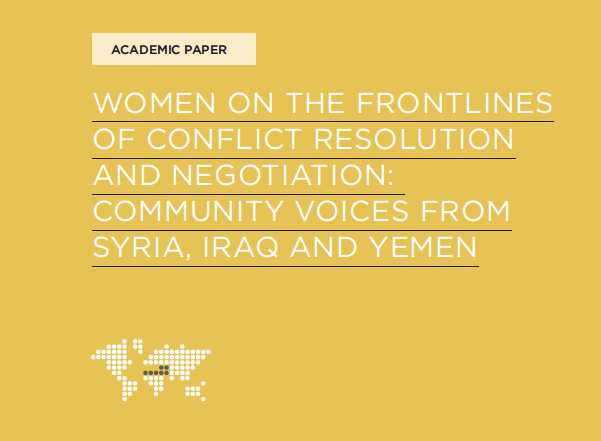Women brokering peace in Iraq
Date:

War, sectarian politics and corruption have dramatically weakened the Iraqi state institutions. Scarcity of resources, weak service provision and the near-absence of protective institutions are driving conflicts at community level.
Faced with these challenges, Iraqi women are working to resolve conflicts within their communities. Two such women are Razan and Nada from the Iraqi Center for Negotiation Skills and Conflict Management (IQCM), a country-wide network of 360 mediators and negotiators, 30 per cent of whom are women, working to de-escalate, manage and resolve conflicts.
As a civil society leader and educational administrator in South Central Iraq, Razan[1] is responsible for disputes in schools in her governorate. Her training at IQCM helped to shift her approach from reliance on punitive measures to a holistic approach to find more constructive solutions to endemic problems. For instance, the prevalence of fraudulent certificates is a prime example of widespread corruption, with an estimated 20,000 civil servants believed to have gained employment using fake diplomas. Instead of referring such cases to the criminal court and tarnish the individual’s personal reputation and future prospects, she now explores alternative disciplinary measures to find corrective and constructive solutions.
Razan believes that a more human-centered approach to resolving conflict can also be applied to political disputes, including ministerial appointments, which are often rooted in personal disputes.
“Vital positions remain vacant for long periods, impacting the state’s ability to provide essential services,” Razan says. “With more human understanding of conflict management, we can address interpersonal causes of disputes before they become unmanageable political issues.”
On the other hand, Nada works in the Kurdistan Region to support displaced minority groups, including Yazidi women, uprooted and many enslaved by the so called “Islamic State”, to claim basic entitlements, such as identification cards and other key legal documents. The first step in her approach is building trust and acceptance from the Yazidi women themselves who are often hesitant to share personal or private information with unknown persons. Once Nada has secured permission from the individual to intervene in a dispute, she begins the process of reaching out to all other relevant parties. In the case of Yazidi women seeking new documents, this includes the government ministries responsible for issuing state IDs, as well as camp and local authorities. In doing so, she uses strong technical mediation skills, including communication, persuasion and consensus building.
Both Nada and Razan point to the value of gaining experience and building a reputation as the primary tools for overcoming gender-based discrimination from men and women alike. With each successful case, they describe a process of ‘proving’ themselves, first within their existing professional circles or networks, and later to the wider community. Their reach and influence as community mediators ultimately depends on trust, legitimacy and a proven track record for fairness.
[1] Name changed to protect identity
Read more about how other women in the region are helping resolve conflict in their communities.